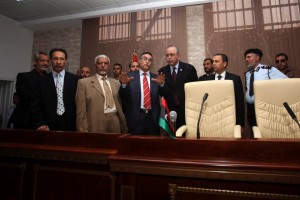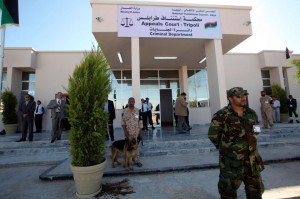Tripoli: April 10 2012:
The recently-converted court room where Libya, not the ICC will try Saif al-Islam was unveiled today in a former . . .[restrict]military school in Hadba al Khadra in Tripoli.
Government sources indicate that within ten days, Qaddafi’s second son is due to be handed over by the Zintan militia, which captured him in the desert last November and has been holding him ever since.
Prime Minister Abdurrahim Al-Kib defended his interim government’s determination to resist demands from the International Criminal Court, backed by the United Nations, that Saif Al-Islam be handed over to them.

“We will respect the international law, ” he told journalists during an organised visit to the newly-decorated courtroom, “but we also have a lot of respect for our Libyan law and I guarantee you there will be no problem.”
In recent weeks, there have been rising tensions between the ICC in The Hague and the Libyan administration. The original ICC arrest warrant was issued last June when Saif Al-Islam was charged with the murder of demonstrators. Thereafter, the list of accusations has expanded to include crimes against humanity.
Once Saif al-Islam was in custody, the international court appeared to assume that he would be handed over to them. At the time, sources in The Hague briefed that had Libya accepted that it would be difficult to organise a trial, be seen by the outside world to be fair. However, diplomatic sources in Tripoli believe that the Zintan militia was not prepared to hand its captive over to the international authorities. It insisted he would only be handed over to the government if it was certain that the trial would take place here in Libya.

Libya maintains that it has the right to try war crimes suspects itself and dismisses any ICC demands for their extradition on the basis of the ICC’s own rules.
Tripoli therefore sought to head off an ICC demand that Saif al-Islam be handed over. However, last week the international judges dismissed any chance of further debate, ordering that the suspect be surrendered without delay. An ICC delegation reportedly arrived in Tripoli on Sunday in a final effort to extract agreement to its demand.
The plan announced today to press on with the trial and complete it by mid-June, before the scheduled parliamentary elections, could however weaken government arguments that the trial will be fair.
As has been demonstrated in The Hague war crimes prosecutions of the late Serbian dictator Slobodan Milosevic and his Bosnian Serb opposite number Radovan Karadzic, the legal process can be tortuously slow. The amassing of evidence and collection witnesses take many months before a prosecution case is considered ready.
Tweet
[/restrict]






